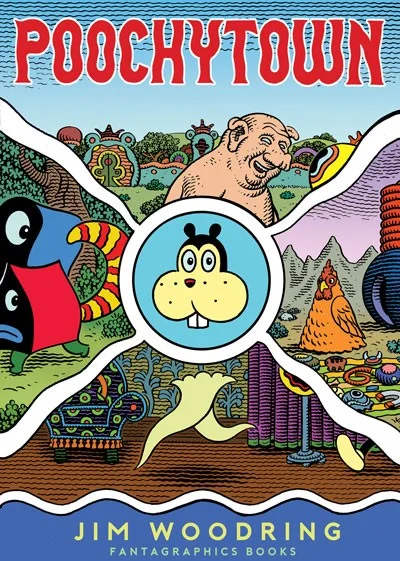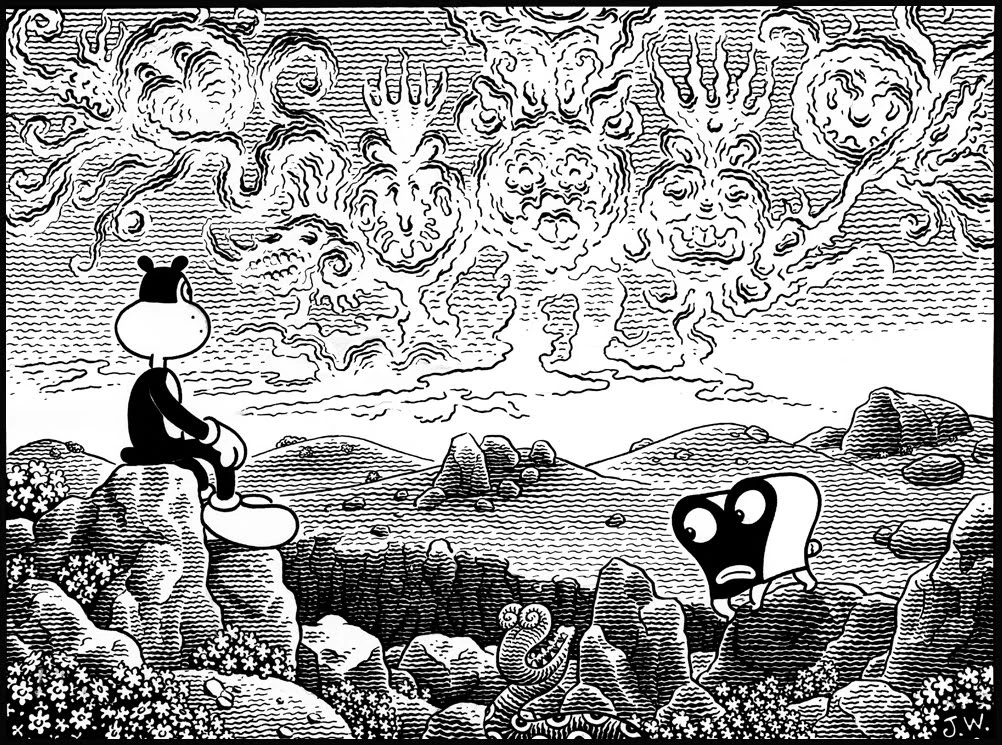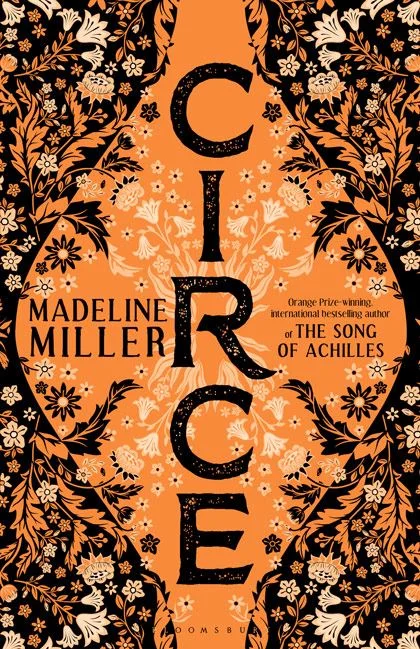I don’t have much intellectual material available for today so I’m just going to note a short film I saw last night - HOW TO BE ALONE written & directed by Kate Trefry. Hopefully it’ll make it to Sundance, or have an accessible availability down the line. Was a really cool psychological thriller — a woman battles (sort-of) physical manifestations of her repressed fears and desires. Stars Maika Monroe (IT FOLLOWS), pulling off a surprising sort of narration too. Trefry leaned into a fun and slightly trendy aesthetic - glossy 80s panoramic colors and pulsing music. It may be one of the only short films I’ve seen that understands it has absolutely zero time to waste and moves at a clip worthy of Lydia Davis…
Character Rursus
Knowing absolutely nothing about Latin, I’ve decided to butcher the language a little bit and use the word rursus (again) to cobble together a phrase: “Character Rursus.” This is when a famous character from literary history (or perhaps even just, history) is brought back in a contemporary work to be rexamined and reinvented. Rursus means “(in) return, again, on the contrary, or turned back.”
I started discussing the idea of it because I’m reading Madeline Miller’s “Circe,” which I talked about in a previous post. Miller does a deep dive into a peripheral (yet always compelling) character in Greek mythology. And while doing so, she tweaks and spins countless other famous Greek figures from Helios to Athena and Odysseus.
When discussing with my wife, we realize this strategy has become extremely trendy in books and even more so television. Once Upon A Time is a entire show built on the mechanics of Character Rursus. Older shows like Supernatural (and most long running episodic genre shows) tend to pull famous people and characters in for one episode cameos, giving their show’s spin on it. Lucifer is an obvious example too. Riverdale, to some degree. There are several others. I guess the distinction for me is that it’s not just a famous person, but a widely recognizable character that’s achieved literary status - that everyone knows the inherent traits of and such.
To me, the older the character being invoked the more interesting it is — the more you can learn. Because it tells us that there’s something resonant about that character, and so the way they change informs how we’ve changed (or would like to change) as the creator/audience.
It makes sense, why artists do this - especially for film/TV/books. There’s a draw to revisiting a character you’re already familiar with, to see how they’ve changed. And, as an audience member, it gives you a certain power-of-the-critic. You already know this character as well as anyone else, so you can be a confident arbiter of whether their re-portrayal is warranted. On top of that, when a character is successfully reinvented it’s thrilling in a different sort of way than meeting a new character altogether, who you have to work to get to know. I find this to be the case with Circe at least. Every detail I associated with her previously is kept, on some superficial level, but the deeper understanding undermines those stereotypes and allows me to root for a character I had never even considered before - but always known.
Jim Woodring - Poochytown
I just have to record my excitement here, that Jim Woodring has come out with a new graphic novel, POOCHYTOWN. It’s really difficult to describe Woodring’s style, and even more difficult to describe the experience of being immersed in his work. It’s fableistic, universal in ways that are almost disturbing to try to comprehend. Disturbing because it’s so psychedelic, so foreign, and the characters behave so oddly - and without any dialogue at all - that to feel related to them is inherently disturbing. But once you feel like you’ve gotten to know them, at times it can be comforting. No matter how strange and nightmarish our different worlds are, we can still find a connection to one another. It’s also just amazing how much expression and nuance he gets across with no dialogue. A CONGRESS OF ANIMALS is one of the greatest graphic novels I’ve ever read, so I’ll be excited to report back how this one compares.
The Love of Insane Artists
This is a follow-up post, inspired by my viewing of MANDY starring Nicolas Cage. Both during and after the film, I found myself thinking: Cage is a truly original actor and truly dedicated to his craft. And simultaneously: I would never dare approach him in real life. And thinking the latter totally reinforced the former. Certainly Cage already has a cult of personality around him, one I think he’s continued to cultivate either consciously or through the sheer creative energy unique to him. It had me wondering why we like to idolize the “insanity” of artists. Why people love the mythology of Van Gogh and all that. I think it provides an easy explanation to most people who don’t consider themselves artists, or most artists who consider themselves insecure (which is… most artists). The idea that: I can comfortably accept this person’s “genius” because I get where it comes from, from a place nobody but them could ever access. And more importantly, it comes from a place that I would never want to access - because it’s unnatural and self-destructive, etc. But there’s a nastier implication there, which I think drives this false narrative. That, oh they’re insane - that’s why they’re brilliant, implies that it’s a natural source, unconscious even. There’s less skill required, less training. And in some cases, that narrative goes so far as to say: proper training would’ve ruined them. Their “uniqueness.” I don’t have a rebuttal to this, but I inherently think this is a wrong and damaging view. To “other” someone like that, discount their talents and no doubt their training (self-taught or otherwise) in order to comfort yourself is a dastardly act. To say they’re not working as hard rather than admit that you don’t understand their process or their struggle is not going to further anyone’s understanding of art. It also blocks out important other facets of each artist’s narrative. For Van Gogh, it was the selfless brother who tried again and again to help and supported him no matter what happened. I honestly don’t know what Cage’s process is (and I’m not saying he’s Van Gogh) but I am saying: I don’t understand him one bit, but damn does he commit to his craft. And that’s all I need to know.
Additional note: just wanted to share this link of a recent interview with Cage. “The Klaus Kinski of California.”
Mandy
Most movies aren’t perfect - MANDY certainly isn’t, but who needs perfection? This film is epic and that’s enough. It’s a film that leans into what it knows it does well: angry psychedelia, pure Nicolas Cage Rage, a bold retro and original soundtrack by the late Johan Johansson, and a solid method of homage with direct appropriation (to metal/rock, to all sorts of 80s films and horror canon). Tonally, it tries to strike a balance between earnest visual beauty (and emotional beauty, for Red & Mandy’s relationship) and balls to the wall demon fighting orgy. The audience I watched it with laughed a lot, at all the right moments. Personally, it was testament to me that Nicolas Cage has secured a place for himself as a truly unique artist — batshit crazy, dedicated to unbelievable emotional displays, and only the finest fringe feature films. MANDY is a great addition to that chapter, and personally I think achieves some newfound visual techniques that I hope to see bleed into mainstream. Panos Cosmatos is a director to watch.
Circe and Historical Re-Working
I’ve already decided to cycle another book into my reading roster, to accompany The Amazing Adventures of Kavalier & Clay and it’s going to be Circe by Madeline Miller. I love the idea of taking a known character from historical literature and flipping it on its head, giving us a far more in-depth view than we were ever allowed previously. In this case, Miller is taking a vilified sorceress known for her vile deeds in the Odyssey (at least, that was mostly how I knew her) and starts with her birth. An entire novel from the first person perspective. It makes me think back to how, when I started writing short fiction, I almost only felt comfortable if I was using this setup: a famous literary character, or an ensemble character in a famous story, and diving into their perspective. I did it with the drunken brother in the Nick Adam’s “Indian Camp” story, and Elpenor in the Odyssey, the ephemeral monster in “The Circular Valley” and the killer in “The Delicate Prey” both by Paul Bowles. There’s something assuring about getting to play in the playground that’s already been built by someone who knows more than you, or at least a playground that’s been made resonant by sheer time of existence (the Odyssey). To be in that world means you’re doing something right. And you have the added bonus of revisiting those same favored main characters, but from a mysterious POV. Basically, you have a lot going for you as a writer. But for me, I could only muster a short story out of this setup. And in reading Circe, a true novel, it strikes me how all your advantages turn to disadvantages. How you could lose someone’s interest when they realize Odysseus will only be a bit player, when you won’t get to learn about your favorite empires but instead will have to absorb new ones, the ones Circe sees. These become challenges to overcome and it’s all the more impressive that Madeline Miller chose this as her world. Chose Greek Mythology for a contemporary update while still diving deeper into it than most. It’s a pleasure to read so far, will check back when I’m done!
Top Writing Music
I’m the sort of writer that has to listen to the same album again and again on repeat as long as I’m writing something. I feel like it’s a Pavlovian trick, once I’ve built the world out in my mind and associate it with the music - every time I replay it, it reinforces the mental environment I’m supposed to be writing in. With that in mind, here’s some of the music I’ve relied on in the past:
Wind River soundtrack - Nick Cave & Warren Ellis
The Proposition soundtrack - Nick Cave & Warren Ellis
The Good, the Bad, and the Ugly soundtrack - Ennio Morricone
Bach’s Cello Suites - Yo-Yo Ma
And some others that have not been as consistently replayed as I worked, yet I definitely got a lot of use out of them: Imarhan, Stone Roses, Tobias Hume.
Taking Stock: the To-Do List
Series document (for the new pilot I wrote, everyone seems to enjoy it but is entirely dubious of where the show goes from there)
Revisions to my latest video essay text
An old feature - to rewrite (for development with a producer)
A new feature - to co-write with a friend whom I’ve co-written one feature with this year
Edit my short story and submit it wide
Blast my writers’ assistant resume out as far as I can
D&D - break some new story ground for the next session :)
- - - - - - - -
This post is pretty dry on its own, so I’m including the NatGeo photo of the day from Glacier National Park.
Daily Writing: What Counts?
Now that I’m entering a new phase of job searching (actively searching for the next writers’ assistant job), I’m returning to the familiar step of writing lengthy catch-up & ask-for-help emails half of every day. It’s fatiguing, but also - I remind myself - another form of writing. It’s a specific audience, each person needs to be addressed in a unique way. Does this immersive correspondence, day in and day out, contribute to my writing skills in any way? It’s hard to say, too many confounding factors with my video essay writing and other assignments going on at the same time. But either way it needs to be done…
Amazing Adventures of Kavalier and Clay
This is my next undertaking at the moment! Thirty pages in and already enjoying it quite a bit. I can already tell his sentences have that uncanny quality of stretching on and on unknowingly so that by the time you’ve completed one of their journeys you hadn’t even realized the story is only just beginning and you’re two pages in. And on a personal level, this is the only time in my post-college life that I’ve met an author (actually worked with him in a writers’ room) before reading any of his work. Who knows how that’ll inform my reading lens!











